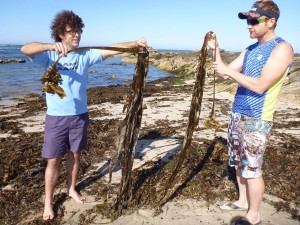Kelp are canopy-forming seaweeds that provide a myriad of resources for associated creatures. Yet, warming events, including global warming, may negatively affect kelp performance. Under the umbrella of the OCEANKELP project that aims to unravel the effect of a range of environmental and biotic processes on the distribution of kelps across continental Portugal, we tested the ability of juvenile sporophytes of two coexisting kelps, Laminaria ochroleuca and Saccorhiza polyschides, to adjust their photosynthesis and respiration to increasing seawater temperatures. L. ochroleuca showed a reduced ability to acclimatize to changing conditions, whereas S. polyschides demonstrated a larger physiological flexibility. These findings are connected with the life-history traits of these species. Additionally, optimum temperatures for the primary production of kelps were assessed, indicating higher values for inter- than subtidal S. polyschides. Our results suggests that, under a warming climate scenario, responses can significantly vary for each species, and that L. ochroleuca is more susceptible to ocean warming than S. polyschides, due to larger acclimatization capacity of the latter. Download the paper from the articles section.
-
Archives
- April 2015
- December 2014
- November 2014
- June 2014
- April 2014
- February 2014
- January 2014
- October 2013
- September 2013
- July 2013
- June 2013
- February 2013
- December 2012
- November 2012
- October 2012
- September 2012
- July 2012
- June 2012
- May 2012
- March 2012
- February 2012
- January 2012
- December 2011
- November 2011
- October 2011
- September 2011
- July 2011
- May 2011
- March 2011
- January 2011
- December 2010
- November 2010
-
Meta

